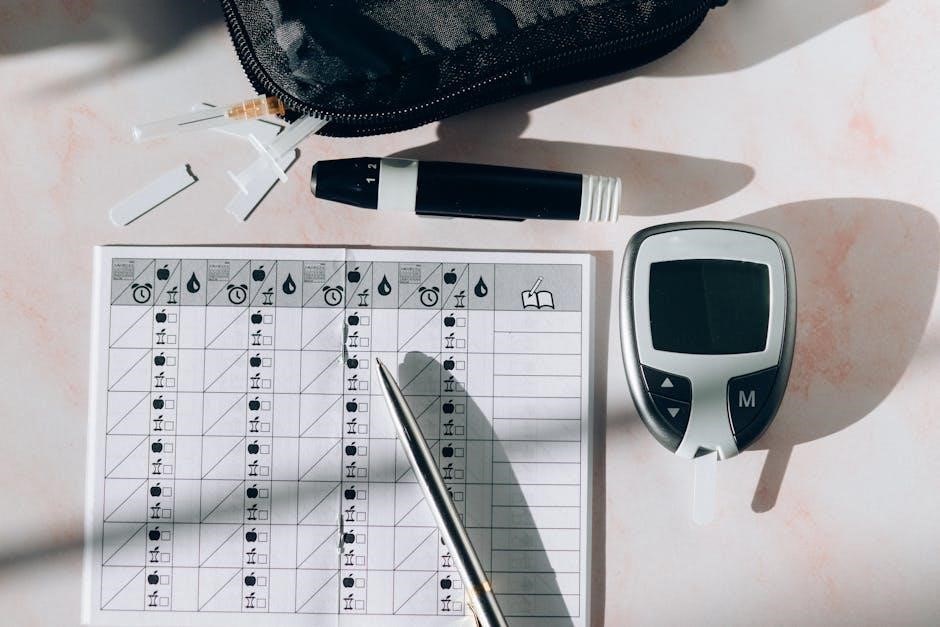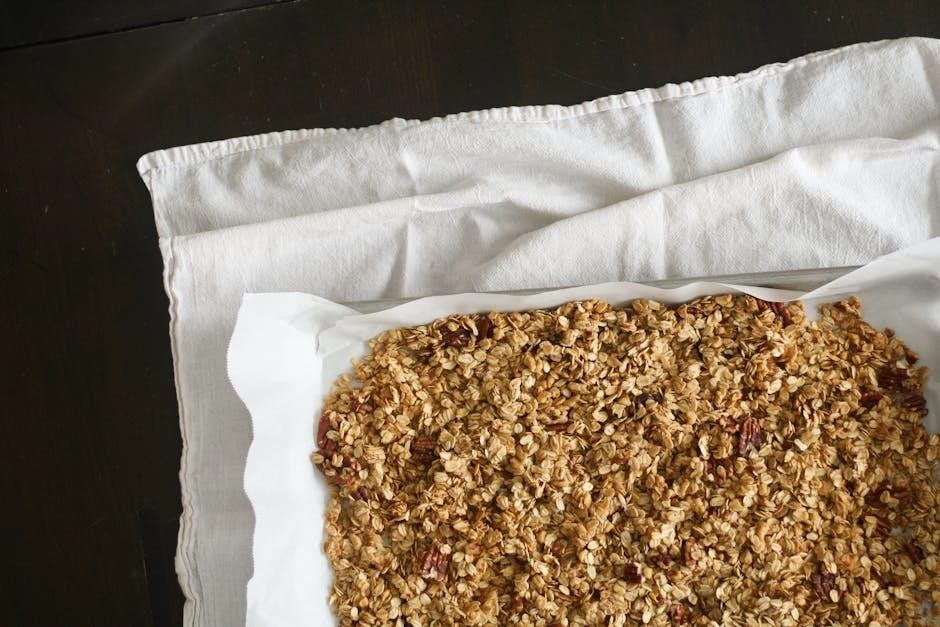Dr․ David Unwin’s diet focuses on reducing carbohydrates to manage blood sugar and promote weight loss, supported by his downloadable diet sheet for type 2 diabetes management․
1․1 Overview of the Dr․ Unwin Diet
The Dr․ Unwin Diet emphasizes reducing carbohydrate intake to lower blood sugar levels and promote weight loss․ It focuses on eliminating added sugars, refined carbs, and processed foods while encouraging healthy fats, proteins, and low-carb vegetables․ This structured approach helps individuals manage type 2 diabetes and improve overall health․ The diet is supported by a downloadable PDF sheet, providing clear guidance on food choices and lifestyle adjustments to achieve sustainable results․
1․2 Who is Dr․ David Unwin?
Dr․ David Unwin is a UK-based general practitioner with extensive experience in diabetes management․ He has gained recognition for his innovative approach to using low-carb diets to help patients reverse type 2 diabetes․ Dr․ Unwin’s work challenges conventional wisdom, offering hope through dietary changes rather than medication alone․ His research and patient successes have made him a prominent figure in the field of nutrition and diabetes care, inspiring many to adopt his dietary strategies for better health outcomes․
1․3 Key Principles of the Diet
Dr․ Unwin’s diet emphasizes reducing carbohydrate intake to stabilize blood sugar levels and promote fat burning․ It focuses on eliminating sugary foods, refined carbs, and processed items while increasing healthy fats, proteins, and low-carb vegetables․ The diet encourages hydration, mindful salt intake, and gradual carbohydrate reduction to ease adaptation․ By prioritizing whole, nutrient-rich foods, the diet aims to improve metabolic health, support weight loss, and reduce reliance on diabetes medications, offering a sustainable approach to long-term health․
Scientific Basis of the Dr․ Unwin Diet
The diet is rooted in managing blood sugar levels by reducing carbohydrate intake, which lowers insulin resistance and promotes fat metabolism for energy, aiding weight loss and improving metabolic health․
2․1 How the Diet Affects Blood Sugar Levels
Dr․ Unwin’s diet significantly impacts blood sugar by minimizing carbohydrate intake, which reduces the need for insulin․ Lowering carb consumption prevents sharp spikes in blood glucose, promoting stable levels․ This approach helps individuals, especially those with type 2 diabetes, manage their condition more effectively․ The diet sheet emphasizes cutting out sugars and refined carbs, which are primary contributors to elevated blood sugar․ By focusing on fats and proteins, the body shifts to burning fat for energy, further stabilizing blood sugar levels and enhancing overall metabolic health․
2․2 Role of Insulin in Weight Management
Insulin plays a crucial role in weight management by regulating fat storage and glucose uptake․ Elevated insulin levels, often triggered by high carbohydrate intake, promote fat accumulation and hinder weight loss․ Dr․ Unwin’s diet aims to lower insulin levels by reducing carbs, allowing the body to shift from storing fat to burning it for energy․ This hormonal adjustment not only aids in weight loss but also improves metabolic health, making it easier to maintain a healthy weight over time․ Managing insulin levels is central to the diet’s success in promoting sustainable weight management․
2․3 Impact of Carbohydrates on Blood Glucose
Carbohydrates significantly influence blood glucose levels, with refined carbs causing rapid spikes in blood sugar․ Dr․ Unwin’s diet emphasizes minimizing high-carb foods like bread, pasta, and sugary snacks, which trigger insulin surges․ By focusing on low-carb vegetables, healthy fats, and protein, the diet stabilizes blood glucose, reducing the risk of sharp fluctuations․ This approach helps regulate blood sugar naturally, supporting overall metabolic health and energy balance․ The diet sheet provides clear guidance on carb choices to maintain steady glucose levels, which is particularly beneficial for those managing type 2 diabetes․

Benefits of the Dr․ Unwin Diet
The Dr․ Unwin Diet promotes weight loss, reduces diabetes medication needs, improves blood lipid profiles, and enhances mental clarity, offering a holistic approach to health․
3․1 Weight Loss and Improved Body Composition
The Dr․ Unwin Diet effectively promotes weight loss by reducing carbohydrate intake, which lowers insulin levels and shifts the body to burn fat for energy․ By focusing on healthy fats and proteins, the diet helps maintain muscle mass while shedding excess fat, leading to improved body composition․ Many users report sustained weight loss and a reduction in body fat percentage․ The diet’s emphasis on whole, nutrient-dense foods ensures that weight loss is achieved in a healthy and sustainable manner, with noticeable improvements in overall physique and metabolic health․
3․2 Reduction in Medication for Type 2 Diabetes
The Dr․ Unwin Diet has been shown to stabilize blood sugar levels, reducing the need for medication in many type 2 diabetes patients․ By focusing on low-carb, high-fat foods, the diet improves insulin sensitivity and lowers blood glucose levels naturally; Clinical evidence and patient testimonials highlight significant reductions in medication dependency, with some individuals achieving complete remission․ Dr․ Unwin’s approach emphasizes dietary changes as a first-line treatment, offering hope for those seeking to manage diabetes without relying heavily on pharmaceuticals․ The diet sheet provides practical guidance for implementing these changes effectively․
3․3 Improved Blood Lipid Profiles
The Dr․ Unwin Diet often leads to improved blood lipid profiles, with increased HDL (good cholesterol) and reduced triglycerides․ By focusing on healthy fats and reducing carbohydrates, the diet promotes a shift from glucose to fat metabolism, which can positively impact LDL cholesterol levels․ Many individuals following the diet report better overall lipid balance, contributing to reduced cardiovascular risk․ The emphasis on whole, nutrient-dense foods helps regulate cholesterol naturally, offering a sustainable approach to heart health without relying solely on medication․
3․4 Enhanced Mental Clarity and Energy Levels
The Dr․ Unwin Diet often results in improved mental clarity and sustained energy levels․ By eliminating blood sugar spikes from high-carb foods, individuals experience fewer energy crashes and brain fog․ The diet’s focus on healthy fats and proteins provides a steady energy source, reducing fatigue and enhancing cognitive function․ Many followers report better concentration and mental performance, as the body adapts to using fat as a primary fuel source․ This metabolic shift supports long-lasting energy and mental sharpness, making it easier to stay focused and productive throughout the day․

Foods to Avoid on the Dr․ Unwin Diet
The diet advises avoiding sugary foods, refined carbohydrates like bread and pasta, and high-carb snacks to minimize blood sugar spikes and promote better health outcomes․
4․1 Sugary Foods and Drinks
Sugary foods and drinks are high in empty calories and cause rapid blood sugar spikes․ Dr․ Unwin recommends eliminating them to stabilize blood glucose levels and reduce insulin resistance․ This includes candies, sodas, and sweetened beverages․ Cutting out sugar helps in managing cravings and prevents mid-morning hunger, as high sugar levels after breakfast often lead to increased insulin and subsequent hunger․ By avoiding these, individuals can better control their blood sugar and support overall health․
4․2 Refined Carbohydrates (Bread, Pasta, Rice)
Refined carbohydrates like bread, pasta, and rice are high in carbs and can significantly raise blood sugar levels․ Dr․ Unwin advises minimizing these to prevent insulin spikes and promote fat burning․ Instead of white bread and pasta, he suggests opting for low-carb alternatives or moderation with whole-grain options․ This dietary adjustment helps stabilize blood glucose, especially for those with type 2 diabetes, and supports overall weight management and metabolic health․
4․3 High-Carb Snacks and Processed Foods
High-carb snacks and processed foods are rich in sugar and refined carbohydrates, leading to rapid blood sugar spikes․ Dr․ Unwin recommends avoiding these to maintain stable blood glucose levels․ Instead, opt for nutrient-dense snacks like nuts, seeds, and cheese, which provide sustained energy without the insulin surge․ Eliminating processed foods helps reduce overall carbohydrate intake, promoting better blood sugar control and supporting weight loss․ Focus on whole, unprocessed foods to achieve long-term metabolic health and energy stability․

Foods to Emphasize on the Dr․ Unwin Diet
High-carb snacks and processed foods are rich in sugar and refined carbohydrates, leading to rapid blood sugar spikes․ Dr․ Unwin recommends avoiding these to maintain stable blood glucose levels․ Instead, opt for nutrient-dense snacks like nuts, seeds, and cheese, which provide sustained energy without the insulin surge․ Eliminating processed foods helps reduce overall carbohydrate intake, promoting better blood sugar control and supporting weight loss․ Focus on whole, unprocessed foods to achieve long-term metabolic health and energy stability․
5․1 Healthy Fats (Avocado, Olive Oil, Nuts)
Healthy fats are central to Dr․ Unwin’s diet, providing sustained energy and reducing hunger․ Avocados, olive oil, and nuts are rich in monounsaturated and polyunsaturated fats, which support heart health and improve blood lipid profiles․ These fats also help stabilize blood sugar levels by slowing digestion and reducing carb cravings․ Incorporating them into meals enhances satiety, making it easier to adhere to the diet․ Dr․ Unwin’s diet sheet emphasizes these fats as essential for both nutrition and flavor, encouraging their liberal use in cooking and snacks to promote metabolic health and overall well-being․
5․2 Protein-Rich Foods (Meat, Fish, Eggs)
Protein-rich foods like meat, fish, and eggs are foundational in Dr․ Unwin’s diet, helping to stabilize blood sugar and promote satiety․ These foods are low in carbohydrates and rich in essential nutrients, making them ideal for weight management and metabolic health․ Lean meats, fatty fish, and whole eggs provide sustained energy and support overall bodily functions․ Dr․ Unwin’s diet sheet encourages their inclusion in meals to balance macronutrients and reduce cravings, aligning with the diet’s focus on whole, unprocessed foods for optimal health outcomes․
5․3 Low-Carb Vegetables (Leafy Greens, Broccoli)
Low-carb vegetables like leafy greens and broccoli are essential in Dr․ Unwin’s diet, offering fiber, vitamins, and minerals while keeping carbohydrate intake low․ These vegetables help maintain satiety and provide essential nutrients without raising blood sugar levels․ Options such as spinach, kale, and cauliflower are recommended, as they align with the diet’s focus on whole, unprocessed foods․ Incorporating these veggies into meals supports balanced nutrition and complements the diet’s goal of improving metabolic health and weight management․
5․4 Full-Fat Dairy Products
Full-fat dairy products, such as cheese, whole milk, and yogurt, are encouraged on Dr․ Unwin’s diet for their nutrient density and satiety benefits․ These foods provide essential fats, protein, and calcium while being low in carbohydrates․ They align with the diet’s focus on whole, unprocessed foods and can help reduce hunger, making them a practical choice for those following the low-carb approach․ Incorporating full-fat dairy supports overall nutrition and contributes to the diet’s goal of improving blood sugar control and weight management․
How to Implement the Dr․ Unwin Diet
Start with a gradual reduction of carbohydrates, increase fat intake for satiety, and stay hydrated while carefully monitoring salt intake to avoid potential side effects․
6․1 Gradual Reduction of Carbohydrates
Dr․ Unwin recommends starting with small, manageable cuts to carbohydrate intake rather than abrupt changes․ This approach helps minimize withdrawal symptoms and makes the transition easier․ Focus on eliminating sugary foods and refined carbs first, gradually reducing portions of starchy foods like bread, pasta, and rice․ Over time, this method helps the body adapt to using fat as a primary energy source, reducing reliance on glucose and improving blood sugar control․
6․2 Increasing Fat Intake for Satiety
Dr․ Unwin’s diet emphasizes boosting fat intake to enhance satiety and reduce hunger․ Healthy fats like avocado, nuts, and olive oil are encouraged to keep you full longer․ This approach helps stabilize blood sugar levels and supports the body’s transition to burning fat for energy․ Incorporating full-fat dairy products and fatty meats can also aid in feeling satisfied, making it easier to stick to the diet․ Increasing fat intake gradually ensures a smoother adjustment to this new way of eating․
6․3 Staying Hydrated and Monitoring Salt Intake
Dr․ Unwin’s diet highlights the importance of staying hydrated, as reducing carbohydrates can lead to increased water loss․ Drinking plenty of water helps maintain energy levels and supports overall health․ Additionally, monitoring salt intake is crucial, as lower carb diets often require more salt to avoid dehydration and fatigue․ Dr․ Unwin suggests listening to your body and adjusting salt consumption accordingly․ This balance ensures proper hydration and electrolyte levels, making the dietary transition smoother and more sustainable for long-term success․

Meal Planning and Recipes
Dr․ Unwin’s diet sheet offers simple, delicious meal ideas, including eggs, avocado, and smoked salmon for breakfast, and hearty meat or fish dishes with vegetables for lunch and dinner․
7․1 Breakfast Ideas (Eggs, Avocado, Smoked Salmon)
Start your day with protein-rich eggs, paired with avocado for healthy fats, or smoked salmon for omega-3 benefits․ Try omelettes with spinach or mushrooms, scrambled eggs with cheese, or avocado slices on a low-carb breakfast plate․ Smoked salmon on a bed of greens or alongside cream cheese on a low-carb cracker is another delicious option․ These breakfast ideas align with Dr․ Unwin’s low-carb approach, providing sustained energy and helping regulate blood sugar levels․ Incorporate these meals into your routine for a nutritious and filling start to your day․ Stay hydrated and consider a pinch of salt to balance electrolytes․
7․2 Lunch and Dinner Options (Meat, Fish, Vegetables)
For satisfying lunches and dinners, focus on grilled or pan-fried meats like chicken, beef, or pork, paired with roasted or steamed low-carb vegetables such as broccoli, cauliflower, or spinach․ Fish options like salmon, trout, or cod are excellent choices, offering omega-3 benefits․ Pair proteins with a variety of colorful vegetables to ensure nutrient diversity․ Drizzle meals with healthy fats like olive oil or butter for added flavor and satiety․ These balanced meals align with Dr․ Unwin’s approach, promoting blood sugar stability and long-lasting energy․ Stay hydrated and mindful of salt intake to support overall health․
7․3 Snacking on Nuts, Seeds, and Cheese
Snacking on nuts, seeds, and cheese is a convenient way to stay satisfied on the Dr․ Unwin Diet․ These options are low in carbs, rich in healthy fats, and provide essential nutrients․ Almonds, walnuts, chia seeds, and pumpkin seeds are excellent choices, offering omega-3 fatty acids and fiber․ Full-fat cheeses like cheddar, mozzarella, or feta are also great snacks, supporting satiety and blood sugar balance․ These snacks align with Dr․ Unwin’s approach, helping to maintain energy levels and reduce cravings for sugary or high-carb foods․ Always opt for portion control to avoid overconsumption of calories․

Common Challenges and Solutions
Common challenges include cravings, carb withdrawal, and social pressure․ Staying hydrated, planning meals, and seeking support can help overcome these obstacles and maintain adherence to the diet․
8․1 Dealing with Carb Withdrawal Symptoms
Carb withdrawal can cause fatigue, headaches, and irritability․ To manage these symptoms, increase fat intake for satiety, stay hydrated, and gradually reduce carbs․ Dr․ Unwin’s diet sheet suggests emphasizing healthy fats and protein to stabilize energy levels․ Additionally, incorporating electrolytes and salt can help alleviate symptoms․ It’s important to remember that these symptoms are temporary and often subside within a few weeks as the body adapts to burning fat instead of carbs․ Planning meals and snacks in advance can also help minimize discomfort during the transition․
8․2 Managing Cravings for Sweets
Cravings for sweets are common when reducing carbs․ Staying hydrated and increasing healthy fat intake can help reduce these cravings․ Dr․ Unwin’s diet sheet suggests planning meals and snacks to avoid impulsive choices․ Incorporating small portions of dark chocolate or berries can satisfy sweet cravings while staying low-carb․ Additionally, focusing on protein-rich foods and fiber from vegetables helps stabilize blood sugar, reducing the intensity of cravings over time․ Remember, cravings often diminish as the body adapts to burning fat for energy․
8․3 Social Eating and Sticking to the Diet
Social eating can be challenging but manageable with preparation․ Plan meals in advance or bring a low-carb dish to gatherings․ Opt for protein-rich or vegetable-based options, and politely decline high-carb offerings․ Staying hydrated and mindful of portion sizes helps resist temptation․ Communicating your dietary choices to friends and family can reduce pressure and gain support․ Remember, consistency is key to long-term success, and small indulgences, like a piece of dark chocolate, can be balanced with healthy habits․
Dr․ Unwin’s Diet Sheet PDF Resources
Download Dr․ Unwin’s diet sheet PDF for a comprehensive guide to low-carb eating, complete with sugar charts and practical advice for managing type 2 diabetes effectively․
9․1 Where to Download the Diet Sheet
Dr․ Unwin’s diet sheet PDF is available on his official website and through Norwood Surgery․ It can also be found on platforms like Pinterest and low-carb forums․ Visit the Norwood Surgery website or search for “Dr․ Unwin’s Low Carb Diet Sheet” to access the downloadable PDF․ Additionally, check his social media channels or related health websites for the latest version․ This resource provides a clear guide to starting and maintaining the diet effectively, including meal ideas and sugar charts․
9․2 How to Use the Diet Sheet Effectively
The diet sheet serves as a practical guide to implementing Dr․ Unwin’s low-carb approach․ Start by reviewing the meal ideas and sugar charts to understand food choices․ Focus on minimizing carbohydrates, eliminating added sugars, and incorporating healthy fats and proteins․ Track your progress by monitoring blood sugar levels and weight changes․ Stay hydrated and adjust salt intake as needed․ Use the sheet to plan meals and snacks, ensuring variety and nutrient balance․ Refer back regularly to stay motivated and adjust your diet as needed for optimal results․

Success Stories and Testimonials
Patients report significant improvements in blood sugar control and weight loss after following Dr․ Unwin’s diet, with testimonials highlighting reduced medication needs and enhanced overall health․
10․1 Patient Experiences with the Diet
Patients following Dr․ Unwin’s diet often report significant weight loss, improved blood sugar control, and reduced reliance on diabetes medications․ Many share testimonials highlighting enhanced energy levels and mental clarity․ The diet sheet provides clear guidance, helping individuals make sustainable lifestyle changes․ Real-life transformations include better overall health and increased confidence․ These experiences underscore the diet’s effectiveness in managing type 2 diabetes and promoting long-term well-being․
10․2 Real-Life Transformations
Many individuals have experienced profound changes through Dr․ Unwin’s diet, achieving significant weight loss and improved blood sugar regulation․ Patients report reductions in HbA1c levels, decreased medication dependency, and enhanced overall well-being․ One participant shared a 30-pound weight loss in six months, while another highlighted improved energy levels and mental clarity․ These real-life stories demonstrate the diet’s transformative impact on health, offering hope and motivation for those seeking to manage type 2 diabetes and adopt a healthier lifestyle with sustainable results․
Dr․ Unwin’s diet offers a life-changing approach to managing type 2 diabetes and weight loss, supported by his PDF guide, providing hope and sustainable health benefits․
11․1 Final Thoughts on the Dr․ Unwin Diet
Dr․ Unwin’s diet is a transformative approach to managing type 2 diabetes and improving overall health․ By focusing on reducing carbohydrates and embracing healthy fats, it helps stabilize blood sugar levels and promote sustainable weight loss․ The diet is backed by scientific evidence and has been successfully implemented by many patients, reducing the need for medication․ The downloadable PDF diet sheet serves as a practical guide, making it easier for individuals to adopt this lifestyle change․ It’s not just a diet but a long-term solution for better health and well-being․
11․2 Encouragement for Starting the Diet
Starting the Dr․ Unwin Diet can be a life-changing decision, offering hope and empowerment for those managing type 2 diabetes or seeking weight loss․ The diet’s focus on reducing carbohydrates and embracing healthy fats is backed by scientific evidence and real success stories․ With the guidance of Dr․ Unwin’s downloadable diet sheet, individuals can confidently take the first steps toward improved health․ Remember, small changes today can lead to significant benefits tomorrow․ Take control of your health and embrace this transformative approach with optimism and determination․
